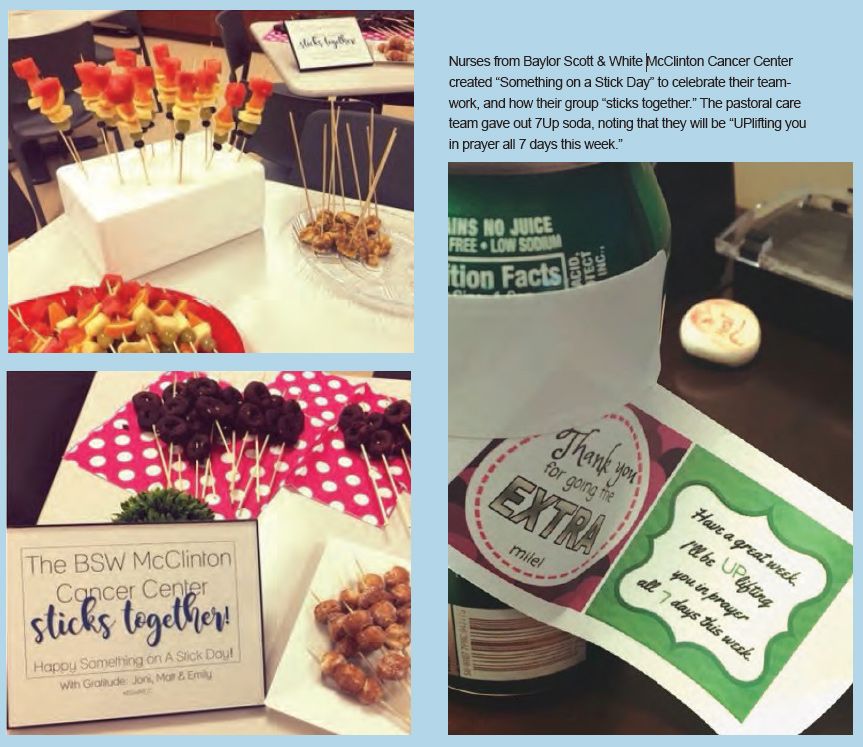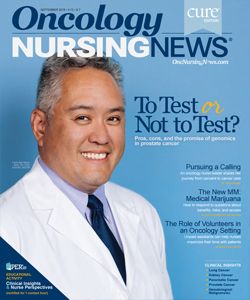Celebrating Nurses All Year Long
Consistent recognition can improve morale and help organizations recruit and retain staff.

Nursing has been rated the most trusted profession for 16 years in a row. Oncology nurses have the special honor of fighting alongside patients and their caregivers at one of the most vulnerable times of their lives. But nurses do not earn professional athlete salaries. So, when and how do nurses get the credit and appreciation they deserve?
For 1 week out of the year, millions of nurses join others to celebrate National Nurses Week, beginning May 6 and ending May 12, Florence Nightingale’s birthday. There are videos, well wishes, cartoons on social media, coupons for free food and drinks, special discounts, and even Nurses Week greeting cards. But 1 week is not enough.
How do we encourage student nurses to explore oncology, inspire new nurses to get a great start in the field, or nurture seasoned oncology nurses to remain in it? This article will explore some ideas for recruitment and retention in the oncology nursing field.
WELCOME STUDENTS
Very few nursing schools offer an oncology elective; many do not have expert oncology faculty. As a result, students are unaware of the endless possibilities in oncology nursing, including hospital staff, clinic, doctor’s office, research nurse, industry, screening and detection, genetic counseling, education, or hospice.
To engage students to consider oncology nursing, the Dallas Chapter of the Oncology Nursing Society (ONS) and many other ONS chapters welcome students at bi-monthly meetings with limited free attendance, and students can attend the Oncology Certified Nurse review meetings for $20. Students are recognized and celebrated each year at the Dallas Chapter’s January anniversary dinner, and scholarships are available from the chapter for its members to get continuing education credit and attend undergraduate and graduate school. The Dallas Chapter’s Board added a student nursing position to better learn about their specific needs. In response to a member survey, the chapter recently organized a social networking time with its first activity at a dine-in movie theater.
Baylor Scott & White Medical Center-Hillcrest in Waco, Texas starts recruiting even before students choose nursing. Each year, staff host a high school senior lock-in for select students with plenty of food, games, special guest speakers, private tours, giveaways, and unique clinical experiences. The teens learn about communication, teamwork, and nurses who fight cancer, as well as get behind-the-scenes tours and a taste of the night shift.
REACH MILLENNIALS
Millennials are the first generation to be conditioned to use technology for everything—they are true digital natives. How does that impact communication and learning and how the profession offers support to nurses of this generation? Millennials often want bite-size communication with more showing than describing. To reach millennials, for example, one might:
- Text a link to a continuing education activity or article with a brief introduction. “New article on barriers to participating in clinical trials. Thought it might help you in your new role as research nurse.” No lecture, no lengthy communication, but clear instructions of how it might impact them.
- Email a new oncology nurse during orientation to ask, “How is your internship this week?” Although this may seem simple, Millennials prefer more open-ended questions. Listen more, converse.
- Forward a Facebook post of a cartoon with the message, “In case you need a smile today.” Millennials often look for work-life balance, so humor can have a positive impact. They appreciate playfulness, as gaming is ingrained in their lives.
PROMOTE SUSTAINABILITY
Oncology nursing can be a high-stress environment with significant consequences: turnover, burnout, compassion fatigue, moral distress. Think of ways to promote a positive work environment and celebrate even the little victories. Although some believe a healthy work culture comes from management, it can also grow from the bottom up. Therefore:
- Celebrate successes of both individuals and teams. Perhaps your patient was able to attend their child’s birthday party because of your suggestions on how to manage fatigue. Or your patient rang the bell today signaling the completion of chemotherapy. Be open to opportunities to celebrate even small accomplishments.
- Cultivate a positive work environment. Vow to not complain, criticize, or gossip. Look for ways to compliment or appreciate someone else. Consider writing down 3 good things about each work day.
- Get creative. Think of ways that you personally or management can sup-port each other that do not break the budget. Create a culture of encouragement and fun. Nurse leader Joni Watson, MBA, MSN, RN, OCN, and her team at Baylor Scott & White celebrated “Something on a Stick Day” and “National Popcorn Day” with cheesy jokes, and the pastoral care department distributed cans of 7-Up soda with a note taped to it reading, “Thanks for going the extra mile! Have a great week. I’ll be UPlifting you in prayer all 7 days this week.”
Look for opportunities to celebrate nurses every day, not just during National Nurses Week. It can make a difference in the way staff feel about their work, themselves, and the profession. What are your tips for celebrating oncology nursing all year long?
Any suggestions to recruit or retain oncology nurses? Share them on Twitter with hashtag #OncNurseConnect!

Innovative Program Reduces Nurse Turnover and Fosters Development
Published: September 12th 2024 | Updated: September 12th 2024The US Oncology Network (The Network) has developed one of the most comprehensive programs in the nation to support the professional development and retention of new oncology nurses.



